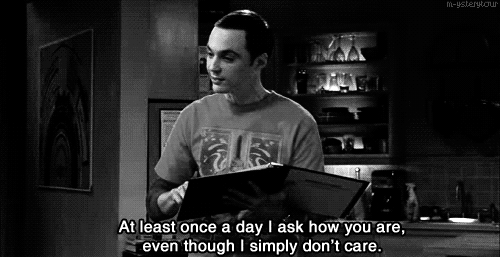Once upon a time, TV’s nerds, geeks, freaks and “poindexters” were woefully confined to the positions of victim, underdog or comic relief, but as geek culture began to grow into its current golden age of mainstream credibility, the archetypal TV nerd has grown with it. Departing from our traditional understanding of alpha-male characters commanding social authority through physical prowess, the alpha-nerd’s dominance is asserted through intellectual superiority.
“Smart is the new sexy,” Stephen Moffat declared through Irene Adler’s mouth in the first season of Sherlock. Moffat’s retooling of Arthur Conan-Doyle’s brilliant detective is the full realization of the alpha-nerd 1.0 design he partially grafted onto The Doctor in Doctor Who, a direct reflection of Chuck Lorre’s Dr. Sheldon Cooper from The Big Bang Theory, and to a certain extent, Hugh Laurie’s Dr. Gregory House from House. Unfortunately, the alpha-nerd has inherited all of his ancestral bully’s bad habits: belittling his ‘inferiors’, equating emotional sensitivity with weakness, and poor treatment of women. It is these traits that expose the underlying toxicity of his sharp wit, making his prominence in otherwise fairly well written TV shows frustratingly off-putting.
First, lets get the ‘sick rather than a dick’ scapegoat theories out of the way. A whole heap as been written online about the possibility that characters like Sherlock Holmes’ and Sheldon Cooper’s socially dysfunctional temperaments are in fact down to undiagnosed disorders like autism and Asperger’s syndrome.
I’ll tackle Sheldon first. Though this reading is a fair one—and even applauded by some in the autism community—it was disproven all the way back in 2009 by co-creator Bill Prady. So, when Sheldon says horrible ‘hilarious’ lines like, “I never said that you’re not good at what you do. It’s just that what you do is not worth doing,” or “It must be humbling to suck on so many different levels,” it’s not because of a developmental disorder of the brain—he’s just a dick. Similarly, when he espouses that, “Sheldon Cooper does not cry,” or that “feelings” belong at a “hippy love-in”, it’s not because he can’t process his or others’ emotions, it’s just that he chooses not to, and uses this choice as a verbal stick with which he beats his underlings into submission.

Unlike Prady, Moffat is unafraid of labels, demonstrated by Sherlock’s self-diagnosis in the pilot: “I’m not a psychopath […] I’m a highly-functioning sociopath, do your research!” Okay, so he gets a free pass for dick-ishness, right? Nope. Someone who actually did her research is psychologist Mary Konnikova. “Psychopaths and sociopaths are the exact same thing,” she explained in an essay for i09. On Holmes’ apparent lack of emotion, she went on to say: “It’s not that he doesn’t experience any emotion. It’s that he has trained himself to not let emotions cloud his judgment.”
Whilst these empathy lobotomies allow for the quick-fire burns these characters are loved for, they still create an inconsistency between what we’re supposed to accept about them and their actions. If the benefit of masterfully controlling your emotions is increased analytical productivity, then why waste the mental on the quips and insults at all?
It’s because it’s not enough to be the smartest of the smart; an alpha-nerd has to constantly assert his intellectual dominance over his peers through degradation of their self-esteem, accomplishments and inability to control their emotions as effectively as he can. In the ‘Jock World’ of the traditional alpha-male, this would be the equivalent of picking smaller dudes up by the lapel and ramming them into lockers.
This makes the women of an alpha-nerd’s world, whom stereotyping dictates as the least able to keep feelings out of their analytical and decision-making processes, attract the most ire from the alpha. (See: most of Sheldon’s interactions with waitress Penny, and likewise for Sherlock with the much-maligned pathologist Molly Hooper.)

Unlike the traditional alpha-male who establishes power through sexual promiscuity, for the alpha-nerd, it is the suppression of these desires that feeds his superiority further. “I’ve always assumed that love is a dangerous disadvantage,” Sherlock tells Irene Adler in “A Scandal in Belgravia.” Yet, this commitment to non-commitment is always tested by a devilish seductress: the ‘mysterious woman’. Though versions of the trope pop up in fiction all over the place, in this context, mysterious women serve as singular female characters who can match or occasionally best the alpha-nerd’s brilliance, as well as try to nullify accusations of poor gender representation. Whereas intelligent men are challengers to the throne, the mysterious woman’s intelligence is at once threatening and alluring. Alluring because she has womanly bits. And she knows what to do with them.

This is where the ‘mysterious’ element lies. Sherlock can ‘read’ anyone to make astounding deductions, so in “The Sign Of Three,” Irene Adler [otherwise known just as “the woman”] confronts him for the first time in the nude, leaving him utterly speechless. Even with her clothes on, she continues to perplex him longer than his male adversaries, as if the absence of a penis is the missing piece of an unsolvable puzzle. This exact dynamic is oddly mirrored in a long-running gag in The Big Bang Theory, in which Raj Koothrappali (part of the ‘beta-nerd’ pack that alpha, Sheldon, hierarchically dominates) suffers from selective muteness in the presence of women. The undertone is that womanly bodies—Medusa-like—are bizarrely capable of bewitching men into stony silence, their intellectualism, normally expressed through their eloquence, rendered ironically impotent by what their bodies’ desire.
Though she is supposed to counter the alpha-nerd’s ‘quirky’ misogyny with antidotal strength and independence, the ‘mysterious woman’ is also disappointingly little else than a gender-flipped version of him. River Song (Irene Adler’s pre-watershed prototype) is part-Time Lord. Irene Adler is Sherlock Holmes if he turned criminal. TBBT’s Amy Farrah Fowler is basically Sheldon Cooper with more estrogen. (A biological difference that the show uses to slowly mutate its most intelligent female character into the ‘clingy girlfriend’ archetype.)
Everything they do centers around the alpha-nerd. That’s why Irene Alder can self-define as gay and still be in love with Sherlock. Or why River Song can travel anywhere in space and time but always end up by the Doctor’s side. Or why three women with nothing in common other than their nerd pack of boyfriends/husbands in TBBT (Penny, Bernadette and Amy) can magically become BFFs.

What may seem like a whole new breed of leading male protagonist on TV, born from the widespread assimilation of nerd culture into the mainstream, is little more than your average alpha-male with an IQ upgrade. Moffat and Lorre simply disguise old-fashioned chauvinism and macho-posturing as ‘endearing’ eccentricity. Sure, the razor-sharp insults might be funny, but as a female viewer, I just can’t bring myself to root for these misogynistic bullies any longer.
Hannah is a writer, illustrator, librarian (yes, they still exist) and feminasty based in the UK. When she’s not working, you’ll find her collecting Clow Cards, training her Blaziken to be the very best like no-one ever was, and binge-watching RuPaul’s Drag Race. Follow her! She’d like the company: https://twitter.com/SpannerX23
Want more stories like this? Become a subscriber and support the site!
—The Mary Sue has a strict comment policy that forbids, but is not limited to, personal insults toward anyone, hate speech, and trolling.—
Follow The Mary Sue on Twitter, Facebook, Tumblr, Pinterest, & Google+.









Published: Jan 20, 2017 04:27 pm